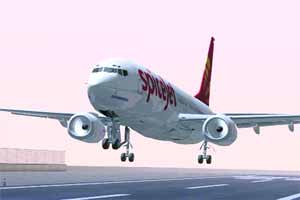With air travellers in distress in the wake of a sharp jump in air fares in the past month after SpiceJet’s flight cancellations, the government is deciding to make a major policy shift by planning to regulate ticket prices by imposing a maximum and minimum range for all airlines. On Wednesday, the civil aviation ministry issued an internal note for discussions, with an aim to cap the maximum fare for economy class at a “reasonable price” of around Rs 20,000. The minimum fare will be based on the per seat break even cost of airlines.
A top ministry official said that the mechanism will likely be finalised in a month after the secretary, civil aviation holds consultations with stakeholders such as airlines and the Directorate General of Civil Aviation (DGCA).
“This will be a major policy shift and is a direct consequence of the SpiceJet crisis. We will see if DGCA can issue an executive order for regulating air fares, or if the Airports Economic Regulatory Authority of India (AERA) Act will need to be changed to include airlines. The maximum and minimum fares will be designed as per the sectors,” he said.
The internal note, as seen by FE, added, “Severe criticism is there from many quarters, including members of parliament, tour operators, passengers, etc that the airline companies are charging very high fares on the immediate day preceding travel and the date of actual travel. There is a need to fix a cap on the maximum fare of economy class at a reasonable price of around Rs 20,000 beyond which the airlines should not be allowed the charge.”
Data compiled by Makemytrip.com on December 17 showed that on the back of SpiceJet’s cancellations, average spot fares had jumped 45% YoY on the Delhi-Mumbai route to Rs 14,484 and 57% YoY on the Delhi-Bangalore sector to Rs 17,570.
Price regulation also aims to tackle alleged “predatory pricing” by airlines, by specifying the minimum fare an airline has to charge. This refers to cases of selling tickets at very low prices such as Re 1, or Rs 5 fares, as done by airlines like SpiceJet and AirAsia in the recent past. Such marketing schemes allegedly favour new players with deep pockets, and make pricing unsustainable for competitors, who are driven into losses. In fact, on April 1 this year, the DGCA had asked SpiceJet to “immediately stop” its Re 1 fare offer just hours after the low-cost carrier announced the super sale.
The DGCA can regulate air fares as per Section 135 of Aircraft Rule (1937). “Where the Director-General is satisfied that any air transport undertaking has established excessive or predatory tariff under sub-rule (1) or has indulged in oligopolistic practice, he may, by order, issue directions to such air transport undertaking,” it says.
Section 134 (1A) further gives powers to the government to regulate fares. It says, “The Central Government may, with a view to achieving better regulation of air transport services and taking into account the need for air transport services of different regions in the country, direct, by general or special order issued from time to time, that every operator operating any scheduled air transport service shall render service in accordance with the conditions specified in such order including any condition relating to their due compliance.”
The ministry note issued on Wednesday also specified several other issues that need to be addressed to improve profitability for the industry. The aviation ministry plans to ask the finance ministry for tax exemption for the income of airlines, lower interest rates for loans at around 8% and access to external commercial borrowings, as well as declaration as an ‘infrastructure’ industry.


